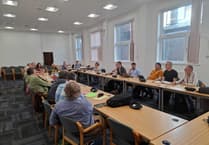A FOREST author who penned a book about the Gloucestershire soldiers who fought gallantly at the Battle of Imjin in the Korean War was invited to honour them at a national service of remembrance.
Ruardean-born Lynne Lambert represented the ‘Glorious Glosters’ at a memorial ceremony entitled ‘Remembering the Korean War’, which marked the 70th anniversary of the Korean War (1951 - 1953) armistice in London at the end of July.
Lynne, who is the daughter of former Forest councillor Andrew Gardiner, published her book ‘Nobber’s Boy’, which centres around her uncle David Gardiner and others such as his friend Roy Mills of Cinderford, in 2021.
The pair were among soldiers of the Gloucestershire Regiment who fought at the Battle of Imjin in April 1951.
Their steadfastness in the face of a much larger Chinese force is credited with blunting the Communist advance on the South Korean capital, Seoul.
Many of the survivors from the Glosters were subsequently captured and endured years in a brutal prisoner of war camp.
Lynne was invited by the BBC and the Royal British Legion to give an address at Horse Guards Parade in the presence of His Excellency Yoon Yeocheol, Ambassador of the Republic of Korea to the UK, and HRH The Duke of Gloucester.
In her speech, Lynne said: “My uncle, David Gardiner and his best friend, Roy Mills - two young national servicemen from the Forest of Dean - were part of 1st Battalion, the Gloucestershire Regiment.
“On 22 April 1951, they began fighting in the Battle of the Imjin River on Castle Hill and then Gloster Hill. After an almighty three-and-a-half-day fight to hold their position - surrounded and out of ammunition - some 450 of the surviving regiment were captured and taken as prisoners.
“Dave and Roy survived the fighting thanks to the actions of Anthony Sheppard, also a national serviceman, who used the last of his ammunition to provide cover for them as they left Castle Hill. When Anthony followed, he was shot and killed. His family never knew how he died and just two years ago, I was able to trace them and it was privileged to be able to tell them how Dave and Roy survived the war in part because of their brother’s sacrifice.
“Once captured, the surviving Glosters were force-marched hundreds of miles to the Prisoner of War camps, up near the Yalu River, and they remained there for almost two and a half years.
“The camps were run by the Chinese and were brutal.
“Some of my uncle’s friends were put into solitary confinement. Others were put into small bamboo cages, unable to move, without any food, were burnt by cigarette butts and urinated on.
“Their camp was divided into two parts. One for the ‘Reactionaries’ - that’s those who refused to sign up to Chinese indoctrination, and one for the ‘Progressives’.
“As a ‘Reactionary’, you were treated very badly. Constant beatings. You attended brainwashing sessions, were forced to listen to Communist propaganda for hour after hour, every day - sitting on cold floors in freezing conditions through winter, and in the terrible heat surrounded by flies in summer.
“I don’t know how they survived. They barely ate. Many had parasitic tapeworms, dysentery, typhoid or beriberi. In that first winter, my uncle counted over twenty bodies being dragged away through the snow every single day.
“I’m here today because I believe all of these stories need to be told. We have to remember. This is our history… but it’s also everyone’s history.”




.jpeg?width=209&height=140&crop=209:145,smart&quality=75)
Comments
This article has no comments yet. Be the first to leave a comment.